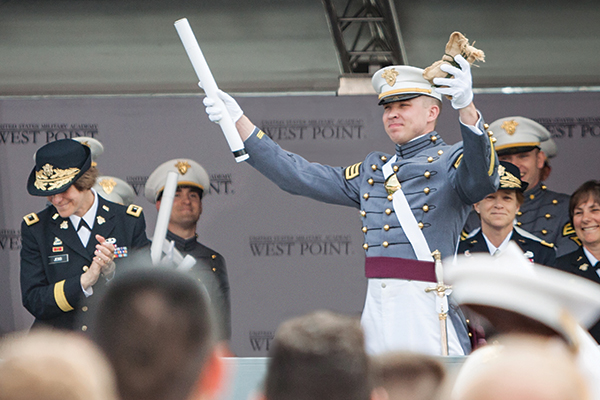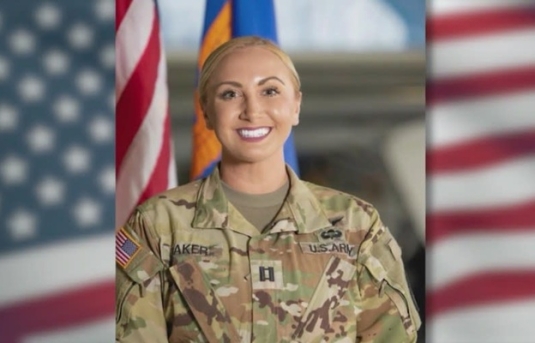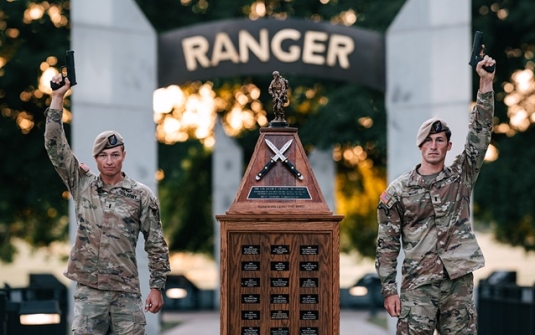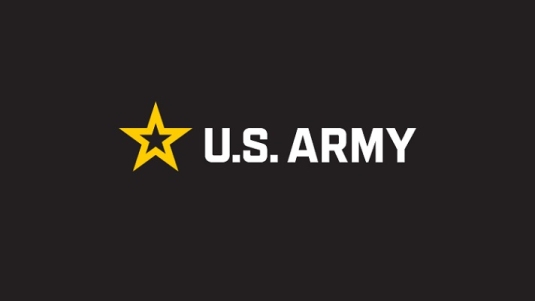By Desrae Gibby ’91, WPAOG staff
Richard Olson, who graduated as the Navy Goat’s goat (lowest rank at graduation) or “anchorman” in 1954, is the earliest documented service academy graduate to get one dollar from each classmate.
According to C.J. Hoppin’s book Same Date of Rank, Olson spent his $710 goat money on his honeymoon. Hunting for the origin of the goat money reveals another treasure—the Richardson legacy family. Major General John B. Richardson IV ’91 (Retired) is a third generation West Pointer. His grandfather, John B. Richardson Jr. ’34, was his class’s goat, and his great-grandfather, John B. Richardson, Class of 1904, a World War I Distinguished Service Cross recipient, was also a goat, making them the first legacy goat duo. Richardson ’34 said the U.S. Military Academy’s tradition of goat money must have started after 1934, as he only got “slaps on the back.” Colonel Herbert Stern ’41 (Retired), the Oldest Living Grad, said his class goat didn’t get money. USMA’s first confirmed goat fund was in 1968; however, it then skipped a few years. The origin of giving the goat something of value is a mystery. It might be connected to giving a silver dollar to the first person who salutes a graduate; it could have also been a facetious bet. What is known is that every goat story begins with classmates motivating a struggling cadet: “Keep fighting! We’ve got your back. No soldier left behind. Hooaaah!” And when that cadet graduates, counting it a team victory, these classmates cheer the loudest and give a gift to recognize the goat’s effort.
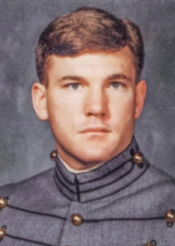
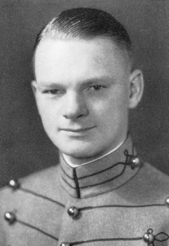
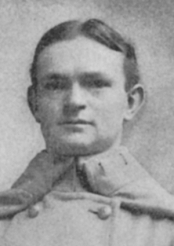
Now- MG (R) John B. Richardson IV ’91 (left) is a third generation West Pointer. His grandfather, John B. Richardson Jr. ’34, (middle) was his own class’s goat, and his great-grandfather, John B. Richardson, Class of 1904 (right) was also a goat, making them the first legacy goat duo.
Richard “Rick” Hawley ’68, the first USMA goat to receive $1 from each of his classmates, likely saved his goat money, according to a family member. He fought to get into West Point (applying three times), fought to graduate, and fought to get into the 101st Airborne Division. Classmates like Michael Brennan ’68 helped him graduate. Brennan said, “When other cadets, under less stress, threw in the towel and resigned, Rick dug in.” Hawley made the most of his West Point experience by participating in nine clubs, including sky diving and scuba diving. He also found his inspiration by visiting the West Point Cemetery, where he is now buried behind “the pyramid.” He was a Vietnam War hero, killed in action in 1970.
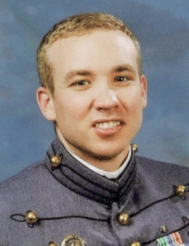
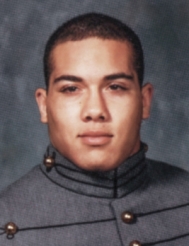
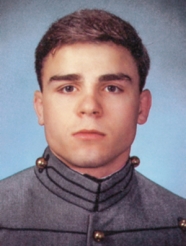
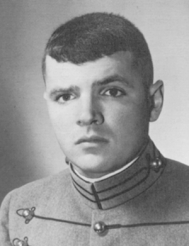
Richard Hawley ’68—KIA (first from left), Stephen Shone ’89—math teacher (second), E.J. Pasteur ’91—gold medal wrestler (third), Tyler Herring ’17— two deployments to Afghanistan (fourth)
Stephen Shone ’89 spent his $913 goat money on a cross-country trip through Canada. His favorite memory was Athabasca Falls in Alberta. When Shone received his diploma to thunderous applause, he had mixed emotions—a combination of shock, relief, and embarrassment. His story is one of perseverance and inspiration. Years after graduating as the goat Shone discovered he had dyslexia. He is grateful to two roommates, Neil Chapman and Neil Sullivan, who tutored and encouraged him. His struggle to graduate taught him some life lessons: “I’m thankful for the struggles that made me stronger…I don’t judge; I try not to label people, knowing that some people are late bloomers.” He left West Point with some unsettled feelings and a desire to prove himself. Which he did, obtaining a Master of Curriculum Design with a 4.0 and becoming a high school math teacher who is knowledgeable of learning differences and who is making an impact on his students’ lives. He often shows them his USMA transcript with his failing grades in calculus, inspiring his students and providing hope to those who may be struggling.
Three other goats took adventurous trips with their goat money, and their lives have been equally adventurous. One went to Pago Pago, the capital of American Samoa, spending his time scuba diving and exploring the jungle island of Tutuila wearing only a lavalava (native skirt). At West Point he was famous for plotting a course to goathood and trading hats with the Superintendent; today, as president and CEO of a properties management company, he is more engineer than goat. E.J. Pasteur ’91 backpacked through Europe with classmate Terry Rice. As a cadet, Pasteur saved money where he could, including not removing the plastic from textbooks so he could sell them back, a practice that likely contributed to him being the goat. “Not surprisingly, I struggled academically,” he said. “If it weren’t for the mentorship of my tactical officer (future Secretary of Defense General Lloyd J. Austin III ’75), I would not have graduated.” In 1993, as part of the Army World Class Athlete Program, Pasteur won the Pan American gold medal in Greco-Roman wrestling. Finally, Tyler Herring ’17 traveled to Thailand, Vietnam, and Cambodia. Herring was deployed to Afghanistan as an enlisted soldier when he got accepted to West Point and was the first member of his family to go to college. On his graduation day General James Mattis (Retired), Secretary of Defense, challenged the Corps to “Hold the Line” and care for the “lives and destinies of valiant Americans.” Herring never got close to “opting out,” so he was surprised when he walked on the stage and received the goat money. After graduation, Herring deployed again to Afghanistan. As a captain, he commanded a basic training unit at Fort Jackson, South Carolina; he is now a business operations manager for an industrial supplier, overseeing 11 locations.
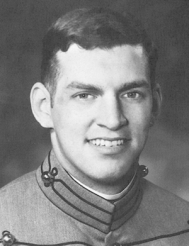
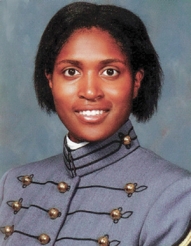
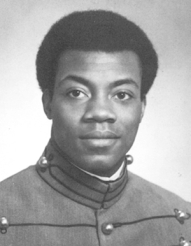
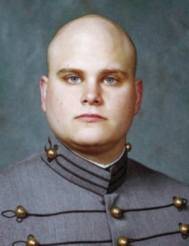
Paul McDowell ’70 — CFO for UConn (first from left), JoTerrica (Williams) Cross ’11 — pursuing Ph.D. (second), Jesse Owens ’76 — retired Army and SSA (third), Thomas Gossweiler ’08 — COO and strength coach (fourth)
Lieutenant Colonel Paul McDowell ’70 (Retired) and JoTerrica (Williams) Cross ’11 bought practical things with their goat money; Jesse Owens ’76 and Thomas Gossweiler ’08 used theirs for wedding expenses.
McDowell’s $740 helped him buy a small car, a VW Fastback, to navigate the roads in Germany. At West Point McDowell struggled, juggling academics and football. He was in the “ejector seat” three times, in front of his regimental tactical officer, future Secretary of State Alexander Haig ’47. The football academic advisor, then Major Pete Dawkins ’59, made him room with star cadets, and his squad leader, Augustus “Gus” Lee ex-’68, helped motivate him. McDowell’s classmates appreciated his efforts. According to his Howitzer bio: “[McDowell’s] sense of humor, spirit of cooperation, and overall friendly attitude put him at the top with everyone…Debbie caught herself one of the greatest guys to go through West Point.” Scheduled to marry Debbie three days after graduation, he didn’t know until the end that he would graduate. Being goat put him in the spotlight. One day, he was watching the game show Jeopardy and recognized his fame in one of the show’s clues: “Reverse academic distinction held by Paul McDowell.” His infamy made it challenging at his first duty station. He had to prove to his commander that he “wasn’t a complete idiot,” which he did by becoming a successful officer, West Point Inspector General and chief financial officer for the University of Connecticut.
Cross used her goat money to furnish a nursery. Busy as a cadet, she helped start the Women’s Boxing Team and participated in several clubs. As the Corps’ spirit officer, she spent hours mentoring plebes while designing spirit banners. When she struggled, she had help from classmates, instructors, and her sponsors. She credits them with sowing the seeds for her future career. At graduation, Chairman of the Joint Chiefs of Staff and that year’s graduation speaker Admiral Michael Mullen admitted that because he was almost an anchorman, he’d worked harder in the Navy. When the Chairman gave Cross a Chief’s coin, he told her he expected “bigger and better things.” She took that to heart. Later, Cross found her passion and graduated summa cum laude with a Master of Social Work. She has a goal to finish her Ph.D. summa cum laude. Williams chose social work because she wants to be “a helping hand,” particularly to veterans.
Upgrading his Colorado Springs wedding is how Jesse Owens spent his $870. Owens had a five-year West Point experience. Despite being turned back, he got a job in Newburgh, New York, and waited to join 1976 and E-4. One of the captains of the Track Team, Owens was “the fastest man at West Point,” and two victories at the prestigious Penn Relays support that. While still in the Army, Owens suffered from heat stroke and almost died. He was medically retired but persevered, returning to the Army and serving until full retirement. Later, he retired from the Social Security Administration.
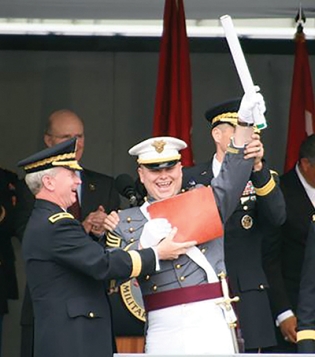
Thomas Gossweiler spent his $1,300 goat fund on a wedding gift for J.J. Griffin ’08 and a trip to San Diego for fellow lacrosse player and classmate Justin Bokmeyer’s wedding. Gossweiler had always wanted to attend a service academy, and West Point had the best lacrosse team. His firstie year, Army Lacrosse beat Navy for the first time in 11 years, earning their first regular season Patriot League title since 2003, and the team was sixth in the nation. Gossweiler is a former chief operations officer for Britten Lift and Installation Services, LLC, and a former strength and conditioning coach for UC Berkeley and the University of the Incarnate Word.
Exotic trips, cars, a nursery, weddings, gifts, household goods, and a watch—that’s not what’s truly of value. It’s the lives well lived. Some goats, often driven by selflessness, were risk-takers who left their comfort zones to feed their hunger for knowledge and challenge. Some were focused on challenges other than academics. Most struggled. When they struggled, they found helping hands along the way. An old saying about the Goat-Engineer Football Game—“As the Goats go, so goes Army”—could be the moral. The Long Gray Line should value all grads: star cadets to goats, First Captains to Century cadets, gray hogs to tie-ups. Besides, upon graduation, star cadet or goat, all are the same rank: second lieutenant. Accolades to all those who look for anyone struggling, give them something of value, and help them reach their potential. They have figured out that engineers are goats in somethings, and goats can become engineers and heroes.
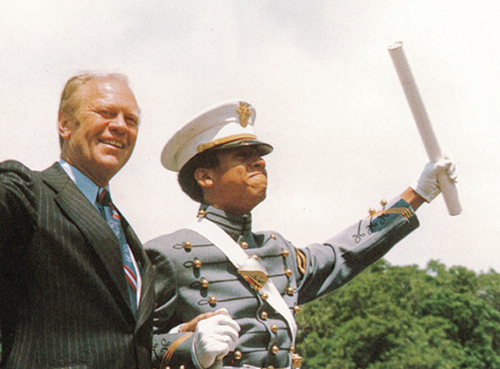
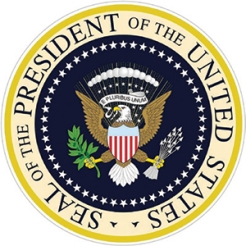
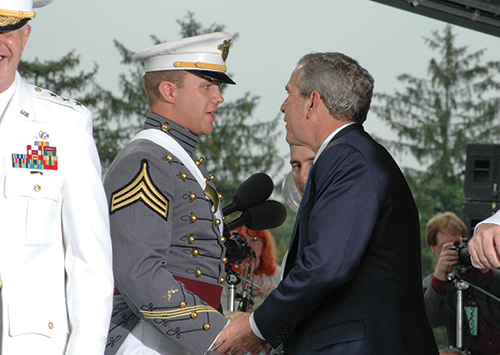
Left: Then-CDT Eugene Shaw ’75, who later supervised 44 systems engineers in developing the Future Combat System, received his diploma from President Gerald Ford. Right: Then-CDT Michael D. Miller ’06, who deployed twice during his 11 years on active duty and once more with the Army Reserve (for which he still serves), received a presidential coin from President George W. Bush.
What do you think? Click here to answer 3 questions.

